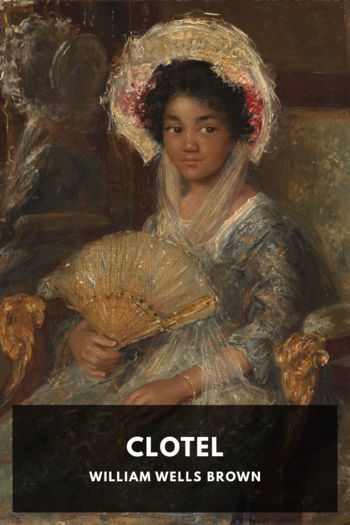Clotel, William Wells Brown [i like reading books .txt] 📗

- Author: William Wells Brown
Book online «Clotel, William Wells Brown [i like reading books .txt] 📗». Author William Wells Brown
James W. Hall
Nov. 26, 1847.
These dogs will attack a negro at their master’s bidding and cling to him as the bulldog will cling to a beast. Many are the speculations as to whether the negro will be secured alive or dead, when these dogs once get on his track. A slave hunt took place near Natchez, a few days after Currer’s arrival, which was calculated to give her no favourable opinion of the people. Two slaves had run off owing to severe punishment. The dogs were put upon their trail. The slaves went into the swamps, with the hope that the dogs when put on their scent would be unable to follow them through the water. The dogs soon took to the swamp, which lies between the highlands, which was now covered with water, waist deep: here these faithful animals, swimming nearly all the time, followed the zigzag course, the tortuous twistings and windings of these two fugitives, who, it was afterwards discovered, were lost; sometimes scenting the tree wherein they had found a temporary refuge from the mud and water; at other places where the deep mud had pulled off a shoe, and they had not taken time to put it on again. For two hours and a half, for four or five miles, did men and dogs wade through this bushy, dismal swamp, surrounded with grim-visaged alligators, who seemed to look on with jealous eye at this encroachment of their hereditary domain; now losing the trail—then slowly and dubiously taking it off again, until they triumphantly threaded it out, bringing them back to the river, where it was found that the negroes had crossed their own trail, near the place of starting. In the meantime a heavy shower had taken place, putting out the trail. The negroes were now at least four miles ahead.
It is well known to hunters that it requires the keenest scent and best blood to overcome such obstacles, and yet these persevering and sagacious animals conquered every difficulty. The slaves now made a straight course for the Baton Rouge and Bayou Sara road, about four miles distant.
Feeling hungry now, after their morning walk, and perhaps thirsty, too, they went about half a mile off the road, and ate a good, hearty, substantial breakfast. Negroes must eat, as well as other people, but the dogs will tell on them. Here, for a moment, the dogs are at fault, but soon unravel the mystery, and bring them back to the road again; and now what before was wonderful, becomes almost a miracle. Here, in this common highway—the thoroughfare for the whole country around through mud and through mire, meeting wagons and teams, and different solitary wayfarers, and, what above all is most astonishing, actually running through a gang of negroes, their favourite game, who were working on the road, they pursue the track of the two negroes; they even ran for eight miles to the very edge of the plain—the slaves near them for the last mile. At first they would fain believe it some hunter chasing deer. Nearer and nearer the whimpering pack presses on; the delusion begins to dispel; all at once the truth flashes upon them like a glare of light; their hair stands on end; ’tis Tabor with his dogs. The scent becomes warmer and warmer. What was an irregular cry, now deepens into one ceaseless roar, as the relentless pack rolls on after its human prey. It puts one in mind of Actaeon and his dogs. They grow desperate and leave the road, in the vain hope of shaking them off. Vain hope, indeed! The momentary cessation only adds new zest to the chase. The cry grows louder and louder; the yelp grows short and quick, sure indication that the game is at hand. It is a perfect rush upon the part of the hunters, while the negroes call upon their weary and jaded limbs to do their best, but they falter and stagger beneath them. The breath of the hounds is almost upon their very heels, and yet they have a vain hope of escaping these sagacious animals. They can run no longer; the dogs are upon them; they hastily attempt to climb a tree, and as the last one is nearly out of reach, the catch-dog seizes him by the leg, and brings him to the ground; he sings out lustily and the dogs are called off. After this man was secured, the one in the tree was ordered to come down; this, however, he refused to do, but a gun being pointed at him soon caused him to change his mind. On reaching the ground, the fugitive made one more bound, and the chase again commenced. But it was of no use to run and he soon yielded. While being tied, he committed an unpardonable offence: he resisted, and for that he must be made an example on their arrival home. A mob was collected together, and a Lynch court was held, to determine what was best to be done with the negro who had had the impudence to raise his hand against a white man. The Lynch court decided that the negro should be burnt at the stake. A Natchez newspaper, the Free Trader, giving an account of it says,
The body was taken and chained to a tree immediately on the banks of the Mississippi, on what is called Union Point. Faggots were then collected and piled around him, to which he appeared quite indifferent. When the work was completed, he was asked what he had to say. He





Comments (0)